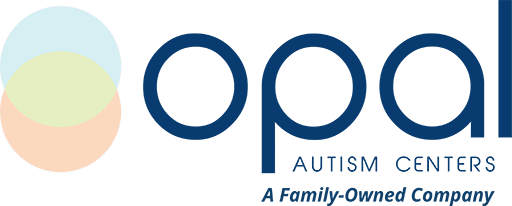If you’ve ever heard your small child say the same word or short phrase over and over again, you may be wondering, “why is my child repeating phrases?” In most cases, verbal repetition like this, called echolalia, is perfectly normal and part of a child’s language development. However, it could also be an indicator of echolalia and autism. Here’s what you need to know and how Opal Autism Centers can help support you and your child.
What Does Echolalia Look Like?
Echolalia generally manifests in one of two different ways – immediate and delayed. Immediate echolalia is when a person repeats back what they just heard. Delayed echolalia is when a person repeats something they heard at an earlier time.
Immediate echolalia can be helpful when a child is processing something new or is learning a new phrase or word. Delayed echolalia can help children develop good recall and can assist them with the commitment of new tasks, words, phrases, etc., to their long-term memories.
Causes of a Child Repeating Phrases Verbally
The repetition of words or phrases that are spoken to the child is usually a normal part of development and can be a way for children to process auditory information. Your child repeating phrases can make connections and better understand what they are hearing. It can also help children practice communication skills. Normal echolalia typically begins around 18 months old and generally fades by age 4 or 5.
That said, some children may continue to use echolalic speech or repeat phrases beyond the preschool years, especially if they have an anxiety or developmental disorder such as autism spectrum disorder (ASD). Research has shown that echolalia can be a sign of autism spectrum disorder, but it does not necessarily mean that a child is undoubtedly autistic.
Children with these conditions may repeat phrases as a way to calm or stimulate themselves, often called “stimming.” Language delays may also factor into verbal repetition and are common for autistic children. Many of these children learn to sign words before they can speak them and may not have the vocabulary to express themselves in the manner they wish for a few years. If you’re concerned about your child’s repeated speech, you can talk to your doctor or a speech therapist for more guidance.
Anxiety & Echolalia
Anxiety can be a normal and healthy emotion in certain circumstances, such as before a big event or in response to a disaster or emergency. But when anxiety starts to interfere with daily life and seems to be triggered by everyday things or even nothing at all, it may be time to seek professional help. Some children may deal with their anxiety by repeating certain phrases or words to feel calmer and more in control of an upsetting situation. If you notice this behavior of your child repeating phrases, especially if it comes on suddenly, you may want to talk to your child about how they’re feeling in their surroundings.
Echolalia & Autism
Autism spectrum disorder (ASD) is a neurological condition that affects social interaction, communication, and behavior. Autistic children process the world around them differently than allistic children, and sometimes have difficulty communicating how they understand things to other people or even themselves. A child may repeat words or phrases as a way to express their needs and wants, or because it helps them better comprehend what someone is saying to them.
Does My Child Repeating Phrases Have Autism?
Autistic children have widely varied support needs, and it may be hard for you to know whether or not your child might be autistic. Many parents look exclusively for the most obvious signs of autism, like difficulty making eye contact or engaging in pretend play. Parents and family doctors may rule out autism in cases where a child doesn’t line up toys, spin in circles, or harm themselves when frustrated, but autistic traits present differently among children, especially in biological females.
Autism doesn’t have to be a frightening diagnosis, whether it involves your child repeating phrases or not. Many autistic people live fulfilling, successful lives, and autistic children can thrive with the right support, tools, and accommodations. If you’re concerned about your child’s development, the best thing you can do is consult with a specialist. A comprehensive evaluation by a team of experts can help you determine whether or not your child is on the autism spectrum.
Understanding Autism & Repetitive Behaviors
A child repeating phrases may be looking for something comforting and it may be necessary in order to process and engage with the world around them. Repetition can take many other forms besides saying the same phrase over and can include self-stimulatory behaviors like hand-flapping, spinning, or rocking. While repetitive behaviors may seem odd to neurotypical or allistic people, they can serve important functions for autistic people.
Treating echolalia caused by autism generally does not focus on ceasing the behavior, but rather, determining the reason for the behavior and how it helps the child. Then, other tools that may offer a replacement or additional support can be explored.
There is no “cure” for echolalia or autism, and autistic people are just as capable of enjoying the world and giving and receiving love as people without autism. The goal of treatment is to help the autistic person and their families obtain specialized support that allows them to reach their best quality of life.
How Opal Autism Centers Can Help
Opal Autism Centers provide a range of services to help autistic people and their families. We offer diagnostic evaluations, individualized treatment plans, and a variety of therapies to help children with autism reach their full potential. We also provide support and resources for families, caregivers, and educators. Call for a consultation now by dialing 888-392-8642.

